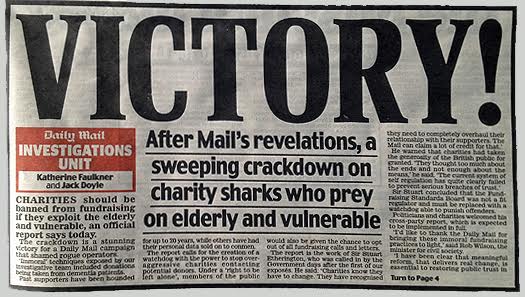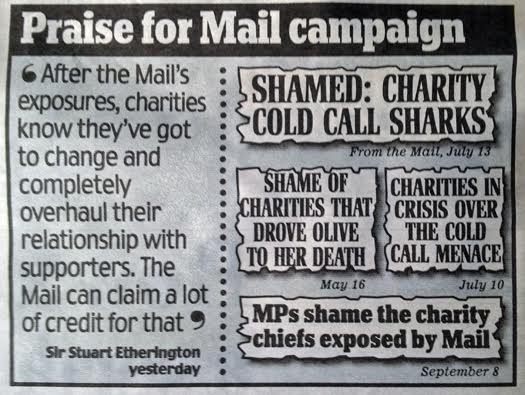Where now for fundraising?
When fundraising is seen as a public enemy, for sure it’s time to change.
To coincide with last Wednesday’s launch of the Etherington Review the BBC published a poll revealing that 52 per cent of donors who give regularly to charity by standing order or direct debit feel ‘pressurised’ by fundraisers into increasing their donations. Eighteen per cent said they feel under ‘a lot of pressure’. The editor of BBC Radio 4’s PM programme, Joanna Carr, said, ‘We commissioned this poll to give us a better understanding of how much pressure charity-givers actually feel they are under to increase their donations.’
So how much pressure is appropriate to get someone to give to charity? Is it ever OK for any donor, anywhere, to feel pressurised into making or increasing a voluntary gift? When does fundraising move from comfortable, to uncomfortable, to unacceptable? And does it really matter all that much?
Judging by the ‘tsunami’ of critical comment that has filled the UK popular press these last several months, the viewing and listening public seems to think it does. The Government, shocked by the national outrage as the fundraising horror stories piled ever higher, demanded a prompt investigation. On the day his review was published Sir Stuart Etherington, chair of the review panel, said, ‘I wish to be clear that charity fundraising has never been more important…This is why it is particularly crucial that we get fundraising right.’
Fundraisers clearly live in interesting times
It seems unarguable. It’s time to construct a better future, not dwell on a tainted past. Yet incredibly some fundraisers still seem to feel that the problem here is not the under-regulated misbehaviours of target-driven fundraisers, but a biased and vindictive media exaggerating the views of a vocal minority.
So this horrible summer of 2015 has to serve as a wake–up call for our sector. Reputation, after all, depends on perception. And anyone who doesn’t see that for huge swathes of our population their perception of charity fundraising has taken an unprecedented battering simply isn’t living in the real world.
Business as usual for the nation’s fundraisers is no longer an option.
Which, for donors everywhere and for the future prosperity of our fabulous voluntary sector if we get the next steps right, might yet turn out to be a very good thing.
This week a group of senior voluntary sector figures backed by more than 120 fundraisers and concerned others have announced initial plans to set up an independent commission to report on and recommend, in detail, best practice that will put donors, not financial targets, back at the heart of British fundraising. The Commission on the Donor Experience will be formally launched towards the end of 2015 under the chairmanship of respected broadcaster and voluntary sector veteran Martyn Lewis CBE.
A lot of words have been employed to describe and dissect our current dilemma. Rather than rehash those now, I’d like to quote a comment from a much loved and respected senior fundraiser who was recently diagnosed with a life-limiting medical condition.
She wrote,
“This year has been a tough one for people in our wonderful profession. The work we all do, the difference we make and even the role and importance of giving itself is being called into question.
“As a fundraiser, I always knew that donations change and save lives. And now, as a ‘beneficiary’, I am seeing that magic from the sharp end.”
Liz MonksAdvertisement
The point is, for Liz and thousands, maybe millions like her, we fundraisers have a responsibility, a precious duty entrusted to us to improve forever the way large sectors of our public view fundraising in Britain.
That’s why the large group of fundraisers mentioned above has come together in this initiative and is asking all parts of the voluntary sector to join with them in making this Commission effective. Its purpose will be to define and improve how donors experience fundraisers and fundraising, to turn that experience, consistently and dependably, from often irritating and uncomfortable into a joyful, life-affirming way for anyone to make a tangible difference in a world of need.
What will the Commission on the Donor Experience do?
It will work in six main areas to turn a well-documented and accepted theory of donor-centred fundraising into consistent, sustainable practice. It will focus at least as much on what fundraisers should do, as what they shouldn’t. And it will consult widely and borrow heavily to achieve this.
1. It will distil and define our best understanding of what donors want and how they feel.
2. It will identify practical things fundraisers can do to ensure donors stay at the heart of all their actions.
3. It will share and communicate that experience far and wide.
4. It will ensure a better experience for new donors at and around the time of their first support.
5. It will look at training and equipping all fundraisers to deliver the best practical donor experience. It will seek to define the skills, attributes and personal qualities they’ll need.
6. It will consider not just the body of existing knowledge, but also what we don’t yet know – how we might innovatively reinvent the donor/cause relationship.
The ideas underpinning the Commission are supported broadly across the sector. Now all fundraisers and interested parties are invited to support, encourage and become actively involved in helping the Commission to deliver its goals. This Commission will work for the benefit of all donors, on behalf of the entire voluntary sector. So please, do get involved.
See also Giles Pegram’s blog, here.
Consultation documents from the Commission on the Donor Experience will be published on its website www.donor-experience.com as soon as possible. (NB the website is not yet functional, but will be soon). To register for updates about the Commission please email me here.
Regulating fundraising for the future: Trust in charities, confidence in fundraising regulation. Download here.
© Ken Burnett 2015
[message_box title=”How would you introduce fundraisers and donors, these days, on your TV show?” color=”blue”]
TV studios are by their nature intimidating. Bright lights, big screens and banks of tangled technology combine with comfy sofas and cameras trailing cable that spin like giddy erratic Daleks creating an instant impression of urgent, organised but incomprehensible busyness. Studio guests sit passively amidst this mayhem, waiting for their interview as, perhaps, death row inmates might await the axeman.

You may still be able to view a short clip from the programme here.
We were the lead item on BBC 2’s morning news programme Victoria Derbyshire. With me on the couch were Paula, a donor, Mhairi, a manager with a small city-based charity and our interviewer, Joanna.
On the big screen from Newcastle was Lucy, who also runs a small charity. No one from any large fundraising charity was anywhere to be seen.
The BBC of course is among the most even-handed of media in giving fundraisers fair hearing. Here’s how Joanna introduced the context of our piece.
• People have stopped giving to charity because of constant pestering to donate more.
• Keen donor the late Mrs Olive Cooke was sent 267 charity letters in one month.
• 444 million items of charity mail sent in 2013 and 14 million calls asking for money.
• Report says fundraisers have to stop taking people’s charitable good will for granted.
• The new Fundraising Preference Service will effectively act like a reset button for how charities can contact their publics.
There was more too. Sir Stuart Etherington’s review Regulating the future of fundraising had just been published that morning. The press, particularly the Daily Mail, were having a field day. And no one could doubt who were the villains of the piece.

The front page of an exultant Daily Mail celebrates that ‘charity sharks’, having been publicly found guilty, now must face the cost.
I started our interview by welcoming the review, principally because it very firmly puts the donor at the heart of fundraising. My companions on the couch expressed their sad condemnation of fundraising and fundraisers too.
Of course these gruesome tales of fundraising excesses make our blood boil. When it’s good, fundraising is brilliant. And mostly it is. But when it’s bad, eeuch! It’s really bad. And let’s be clear: the flood of horror stories all show bad fundraising. How could anyone, anywhere imagine that any of this might be an acceptable way to treat donors? Or even an effective, productive or sustainable way?
So I do welcome the Etherington review, above all because it says we must put donors and donor comfort at the heart of fundraising practice. At last it confirms the bleedin’ obvious. It gives us a chance to ensure that, across the fundraising fraternity, common sense and decency will triumph over short-term self-interest.

Some choice quotes from several noisy days
From Sir Stuart Etherington, Regulating fundraising for the future.
“The Review received sufficient evidence to show the current approach to self-regulation is no longer fit for purpose’… ‘For the public, the right to be left alone, or approached with respect and humility, is equally strong.”
From Karl Wilding, NCVO website.
“The Review is very clear that charities have a right to ask. It is equally clear that the public have a right to be left alone – and that for some, that balance has gone awry. The public have already demonstrated a desire to be able to more easily remove themselves from charity communications: the BBC’s One Show produced a pro forma ‘don’t contact me’ letter, which was downloaded 30,000 times in a week.”
From Stephen George’s blog.
“Here’s the thing. Technique is actually in the way of fundraising. Targets have the wrong focus. Together, finally it’s clear – they are undermining fundraising.”
From Tobin Aldrich’s blog.
“My experience is that most supporters assume that anything sent from a charity is asking for money.”
From Joe Saxton.
“If we want to create sustainable fundraising, we need a regime that will ensure people will give because they love what charities do, not because they feel pressured and hounded.”
Adapted from an Upton Sinclair quote.
“It is difficult to get people to understand something when their salary depends on their not understanding it.”
From a FabCymru tweet.
“Charities should be ethical kind decent. Fundraising should not be just about money. Pleased to see these values addressed.”
Tweeter (name withheld).
“No I do not agree. Ban chuggers, ban 3rd party funding orgs, regulate campaign content”.
Alex Ford tweeted
“I am proud that @PancreaticCanUK puts supporters’ interests firmly at the heart of all our activity. I totally support stronger regulation for charities, highlighted by the @NCVO #fundraisingreview, to ensure donors can give with confidence.”
From Roger Craver, The Agitator, USA.
“What has happened in the UK and is also happening in the US and elsewhere is that too many nonprofits have become more and more distant from their donors. They have resorted to technology, and a quiver of impersonally applied techniques, to unintentionally build a wall of separation… While I‘m opposed to any kind of government intervention in fundraising short of dealing with fraud, this move in the UK has the redeeming feature of forcing the business-as-usual crowd to learn new and better ways of dealing with donors. Perhaps those incapable or unwilling to learn will either retire, quit or be fired.”
From Tobin Aldrich’s blog.
“But individual giving using direct marketing methods accounts for something around £4bn of UK charity income (there is no one undisputed figure). The potential impact of changes which radically reduce the number of people that can be asked for money and the frequency will therefore go into the hundreds of millions of pounds a year, perhaps higher. And this of course won’t be the charities that principally suffer it will be their causes and beneficiaries”.
Links to Ken Burnett’s Future of fundraising series
Part 1 appeared in November 2014 with part 5 published on 17th May 2015.
• Introduction to the future of fundraising.
• Why fundraising has to change.
• A fundraising Utopia.
• Three mega-opportunities for fundraisers.
• Marketing was a mistake.
• Fundraising and the rule of law
[/message_box]
Published with kind permission of Ken Burnett, and simultaneously with 101fundraising.org.



